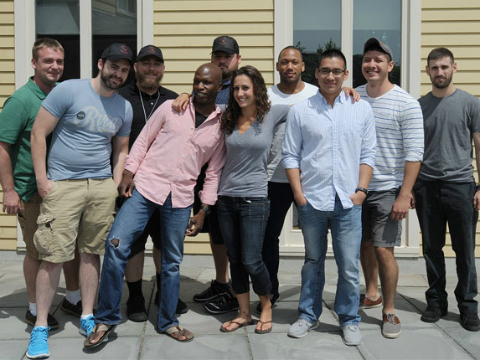
Mandatory social-justice seminars are a ‘timeshare presentation from hell’
As we bid farewell to 2015 this weekend, everyone is reminiscing about the past year and making resolutions for the year ahead.
For college administrators, the events of the fall semester probably aren’t happy memories: unruly student protests followed by unrealistic, vengeful, budget-busting demands.
For activists, the resolutions have one common theme: forcing people to take classes on social justice.
As a student who has sat through several of these seminars, I can say that they are not primarily educational. They are more like a timeshare presentation from hell, where social-justice hucksters sell their talking points and threaten to cast you into outer darkness if you don’t comply.
RELATED: Massive diversity requirement planned for University of Missouri, taught by ‘army’ of TAs
Somehow this cavalcade of crap started at my school, Wesleyan University, where a group of students started a petition to defund the student newspaper because of an article that I wrote.
The demonstrators were successful – The Wesleyan Argus is now in limbo, with more than half of its budget on the chopping block unless the student government reverses its decision.
Because calling this what it is – censorship – is politically unpalatable, the chop is being spun as an environmental and “equity” initiative, not a punishment for publishing my criticism of Black Lives Matter movement tactics.
Yale was next, where a group of students found it intolerable that a professor had the audacity to suggest that college students were mature enough to make their own decisions about Halloween attire. Erika Christakis cancelled her spring classes rather than face more weepy tantrums from crybullies.
Shortly thereafter, the University of Missouri’s football team refused to play and a wealthy grad student went on a hunger strike to demand the resignation of their president because … well, that’s not clear, but it had something to do with the student body president being called a slur and grad students losing their school-provided health insurance (because of Obamacare).
Their success then sparked a series of copycat protests at elite liberal arts colleges across the country. A modus operandi was quickly established – publish a series of far-out demands backed up by vague complaints and then lead a march, all in the name of equality.
A bulwark against basic training
The published demands brought a once-obscure academic word into the public’s vocabulary – “microaggressions.” These are minor offenses that are largely unintentional, such as mispronouncing someone’s name because you’ve never heard it spoken.
I grew up finding it funny when people tried to pronounce “Stascavage.” A football-game announcer introduced me, the smallest guy on the team, as “Sasquatch.”
RELATED: Missouri system president resigns to quell black students’ rage, end hunger strike
During military basic training, I got out of crappy details because drill sergeants couldn’t pronounce my surname: They’d call on someone else whose name they could pronounce.
But apparently I am supposed to be offended by this. Or perhaps not – I’m a white male, so different rules apply to me.
I was taught that the best way to deal with a person that annoyed me was to walk up to them and start a conversation. Because the thought of hashing out differences with their professors terrifies Wesleyan activists, they are demanding a database where they can anonymously complain about them.
Harvard’s hate-crime investigation still hasn’t wrapped up
Responses to the demands varied. Many universities attempted the diplomatic option – agree to read over the demands and work with the protesters in an attempt to appease them.
When appeasement demanded an investigation into some baffling incident of alleged bias, some colleges clammed up rather than explain what they learned from digging deeper, or gave even more curious explanations.
An individual at Duke hung a noose, and in response the university launched an investigation. After the media grew impatient with Duke dragging its feet about the results of the investigation, a student was pushed forward and offered an apology that could have been written by a social justice warrior.
RELATED: Duke noose incident called an inside joke that went horribly wrong
Harvard took a page out of Duke’s playbook and is drawing out an investigation into its own incident – black tape was put over the pictures of black law professors. Several weeks later, following multiple requests from The College Fix for a status update, Harvard says the investigation is still ongoing.
The semester ended on an uneasy note. Many of the protests occurred as finals approached, leaving a lot of unresolved conflicts in the air. When students return after break – and after a month to plan – next semester is shaping up to be as volatile as the previous one.
The Purdue example
One university seems to be handling things well. Purdue recently affirmed its stance for the free exchange of ideas – including opposing views – which is really at the heart of many of the complaints on campus.
RELATED: Team Mitch: Purdue gets ‘green light’ rating for junking speech codes
Purdue’s response is how these demonstrations should be handled: Sit the students down and say the following four words – “shut the hell up.”
Tell them to stop worrying about everyone else and worry about themselves. They aren’t the morality police – they are students. If something displays unambiguous racism at a university, tell the community you’re on the ball and change it. If not, have the constitution to tell students that they are wrong.
Instead, students are being told “yes, yes, you are right, we should do something about that.” If administrators truly care about their students’ character, they won’t be so quick to indulge their most impulsive, least reflective instincts for conquest and revenge.
Like The College Fix on Facebook / Follow us on Twitter
IMAGES: Chris Piascik/Flickr, Posse Foundation






Please join the conversation about our stories on Facebook, Twitter, Instagram, Reddit, MeWe, Rumble, Gab, Minds and Gettr.